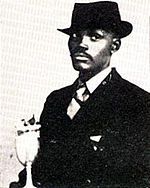Once upon a time, a long time ago, a small miracle took place in the brain of a man named Solomon Linda. It was 1939, and he was standing in front of a microphone in the only recording studio in black Africa when it happened. He hadn’t composed the melody or written it down or anything. He just opened his mouth and out it came, a haunting skein of fifteen notes that flowed down the wires and into a trembling stylus that cut tiny grooves into a spinning block of beeswax, which was taken to England and turned into a record that became a very big hit in that part of Africa.
Later, the song took flight and landed in America, where it mutated into a truly immortal pop epiphany that soared to the top of the charts here and then everywhere, again and again, returning every decade or so under different names and guises. Navajo Indians sing it at powwows. Japanese teenagers know it as [Japanese writing]. The French have a version sung in Congolese. Phish perform it live. It has been recorded by artists as diverse as R.E.M. and Glen Campbell, Brian Eno and Chet Atkins, the Nylons and Muzak schlockmeister Bert Kaempfert. The New Zealand army band turned it into a march. England’s 1986 World Cup soccer squad turned it into a joke. Hollywood put it in Ace Ventura: Pet Detective. It has logged nearly three decades of continuous radio airplay in the U.S. alone. It is the most famous melody ever to emerge from Africa, a tune that has penetrated so deep into the human consciousness over so many generations that one can truly say, here is a song the whole world knows.
Its epic transcultural saga is also, in a way, the story of popular music, which limped pale-skinned and anemic into the twentieth century but danced out the other side vastly invigorated by transfusions of ragtime and rap, jazz, blues and soul, all of whose bloodlines run back to Africa via slave ships and plantations and ghettos. It was in the nature of this transaction that black men gave more than they got and often ended up with nothing. This one’s for Solomon Linda, then, a Zulu who wrote a melody that earned untold millions for white men but died so poor that his widow couldn’t afford a stone for his grave. Let’s take it from the top, as they say in the trade.
Part One: A Story About Music
This is an African yarn, but it begins with an unlikely friendship between an aristocratic British imperialist and a world-famous American negro. Sir Henry Loch is a rising star of the Colonial Office. Orpheus McAdoo is leader of the celebrated Virginia Jubilee Singers, a combo that specializes in syncopated spirituals. They meet during McAdoo’s triumphant tour of Australia in the 1880s, and when Sir Henry becomes High Commissioner of the Cape Colony a few years later, it occurs to him that Orpheus might find it interesting to visit. Next thing, McAdoo and his troupe are on the road in Africa, playing to slack-jawed crowds in dusty mining towns.
This American music is a revelation to “civilized natives,” hitherto forced to wear starched collars and sing horrible dirges under the direction of dour white missionaries. Mr. McAdoo is a stern old Bible thumper, to be sure, but there’s a subversively rhythmic intensity in his music, a primordial stirring of funk and soul. The African brothers have never heard such a thing. The tour turns into a five-year epic. Wherever Orpheus goes, “jubilee” music outfits spring up in his wake and spread the glad tidings, which eventually penetrate even the loneliest outposts of civilization.
Read the whole article with photos and videos here:
https://getpocket.com/explore/item/in-the-jungle-inside-the-long-hidden-genealogy-of-the-lion-sleeps-tonight
Postscript
As this piece was going to press, Linda’s daughters called in a state of near-hysterical jubilation to report the arrival of fabulous riches in their joint account. We raced to the bank, and there they were – two fat checks from TRO, totaling nearly $12,000, arising from the use of “Wimoweh” in a U.S. television commercial. The daughters were dumbfounded. It was the most money they’d ever seen. Inquiries revealed that one of the checks had gone at first to Pete Seeger, who had been earning money from the song all along. “I didn’t know,” he said, explaining that his business people had for years been diverting his share of “Wimoweh” royalties into a charitable trust, and that it was only when this big check arrived that he realized his earlier version had been mistaken. Chagrined, he returned the windfall to TRO, with instructions that it be sent to Soweto.
This marked the start of somewhat better times for Solomon Linda’s daughters. Reporters from all over the world came to visit, and their case became something of a cause célèbre. The BBC financed a documentary film about their father. Danish pop star Bamses Venner hired them to sing backup on a new version of “Mbube.” Pete Seeger wrote impassioned letters to the United Nations, demanding reform of international copyright conventions. An advertising agency called The Jupiter Drawing Room sponsored a CD that told the story of the wronged Zulu songwriter in music, and South Africa’s Ministry of Arts and Culture convened a task force to look into the matter.
This article was originally published on May 14, 2000, by Rolling Stone.


